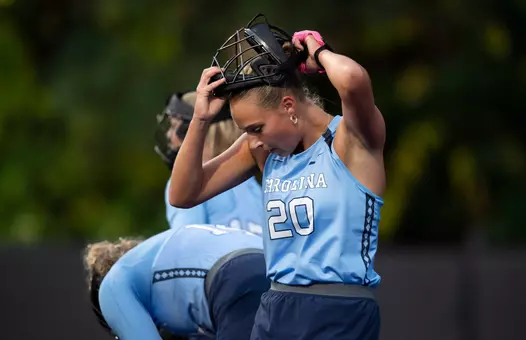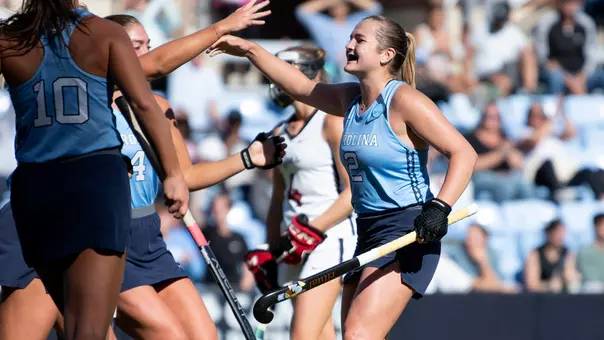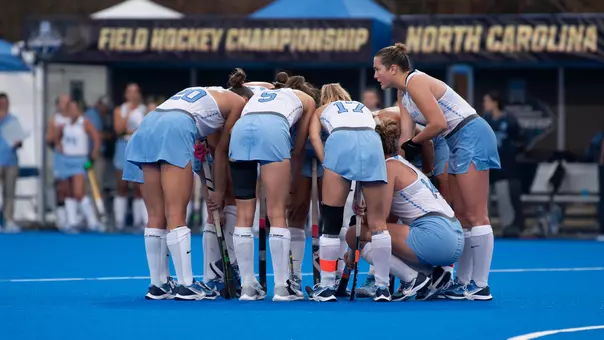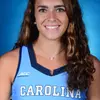University of North Carolina Athletics
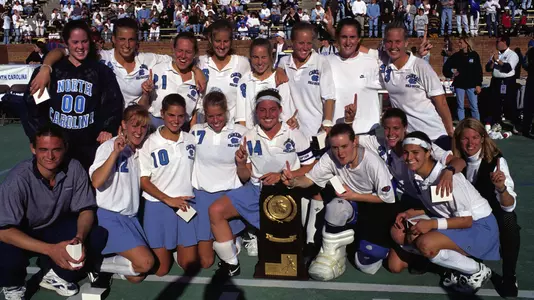
Celebrating the 1995 NCAA title, UNC's first. Shelton is far right on the front row, Durling is third from right in back.
GoHeels Exclusive: Shelton's Legacy Extends Far Beyond The Field
October 5, 2018 | Field Hockey, Featured Writers
By Pat James, GoHeels.com
Karen Shelton never planned to be a head field hockey coach, not at North Carolina nor anywhere else.
At West Chester State, she studied health and physical education. Her mentors taught those courses. And she desired to do the same. But as a three-time national champion and national player of the year, as well as a standout on the U.S. national team, she boasted more experience than any other potential candidate when the UNC job opened in 1981.
Dolly Hunter, the Tar Heels' coach from 1976-80, realized this. So looking to leave the field hockey program in good hands, she called Shelton.
Initially, Shelton said she wasn't interested in the position. She was applying to be a Northwestern assistant coach, a role that was conducive to executing her national team duties. But eventually, Hunter convinced Shelton to visit Carolina. And she quickly became sold.
"I was on the campus for about 15 minutes, and I'm like, 'Wow,'" Shelton said. "This was something that I felt I could work to build a program with. So even back in those days, I think I had good vision for what this could become."
Thirty-seven years later, it's that and much more.
Since becoming the program's fourth head coach, Shelton has led UNC to six NCAA championships, 20 Atlantic Coast Conference titles and 35 winning seasons. Her 657 career wins rank second in Division I field hockey history. The Tar Heels also hold records for NCAA Tournament appearances (34), games played (90) and wins (62).
Much of that Shelton envisioned when she first visited Carolina. But she never anticipated she'd receive her latest honor.
On Sept. 24, the University announced its new field hockey stadium would be named after Shelton, making it the first UNC athletic playing facility to be named in honor of a woman. Three games have been played at Karen Shelton Stadium since then. Saturday, a dedication ceremony will be held before the top-ranked Tar Heels play Wake Forest at 1 p.m.
"I didn't expect it at all," Shelton said. "I'm just so thrilled for my family. I think about my parents and how my parents would have been really proud; I've lost them both. And for women on campus, I think it's a great statement. I think it's a statement for our athletic department and our University moving forward.
"I'm just overwhelmingly humbled by this. I cried because I don't think that I'm worthy when you think about it in the history of this program."
Her current and former players disagree. Karen Shelton Stadium couldn't possibly be named anything else, they say. And her coaching accomplishments aren't the only reason why.
Becoming the best you can be
Only three scholarships were at Shelton's disposal when she arrived at Carolina. But because any high schooler who was interested in playing for UNC could come to campus and try out, Shelton could easily watch them in person and evaluate who the best athletes were.
Not everyone who joined the team stayed, though.
As a player at West Chester State, Shelton lost one game. Her coach, Vonnie Gros, also coached the national team, which Shelton played for from 1977-84. So after becoming the Tar Heels' coach before the 1981 season, Shelton trained her players the only way she knew how – hard.
Subsequently, some players quit. But many, including Leslie Lyness (1986-89), found pride in being selected to play for Shelton.
"She was this icon …" Lyness said. "To have somebody of her caliber, coming off the (1984) Olympics with the bronze medal, and now she's your coach, not only do you not want to mess up because you're terrified of messing up because she thinks you're an idiot, but you want to impress her. You want to prove to this person who put their faith in you that you're worthy.
"I was going to do anything she asked me to do because I knew if I could become close to what she was as a player, I was going to succeed in what my goal was, which was to be the best I could be."
Gradually, all of Shelton's players embraced a similar mindset.
She taught them the importance of grit and determination, the benefits of resiliency and that their potential is greater than they or anyone else perceives. Lyness applied those lessons as a player, helping Carolina to its first final four appearance in 1986, its first runner-up finish in 1987 and its first national title in 1989. She also won the Honda Award in 1989.
But Shelton's guidance kept paying dividends after Lyness' field hockey career.
After playing for the U.S. national team that took fifth at the 1996 Summer Olympics, Lyness returned to UNC to complete her requirements for medical school. Almost three years passed. But every time she applied for medical school, she was denied.
Discouraged, she considered giving up. But she remembered the lessons Shelton taught her, and she continued applying. She's now a neurosurgeon at Geisinger Health System in Moosic, Pa.
"I think the ability to just sort of go back (to UNC), watch the girls play, see how passionate Karen was about the team and the goals and what she wanted for the group," Lyness said, "it just kind of reminds you of what you want and how to get there and maybe to think about all those losses you get on the field and how then you have to try to come back and win again."
Creating young leaders
Lyness and her teammates set the standard when they won the 1989 national championship, bringing newfound attention to the program. But the opportunity to play for Shelton was what primarily drew Joy Driscoll Durling (1994-97) from San Diego to Chapel Hill.
"If I was going to commit to try to play for a Division I school, I wanted to play for one of the best and I wanted to learn from one of the best," Durling said. "That's what her brand is. It's beyond a brand, it's reality."
That became even more evident from 1995-97. The Tar Heels won three straight national titles in that span, and Shelton was twice named the National Coach of the Year.
Durling said not all of her teammates on those teams were best friends. But Shelton's ability to bring them together allowed them to succeed. Durling also added that Shelton excelled by surrounding herself with coaches and staff who filled her blindspots. That included a sports psychologist – a position that was far from mainstream then.
What struck Durling the most, though, was how Shelton worked and collaborated in what was, and still is, a male-dominated field.
"She led by example, and she didn't lead with the fact that she was female," Durling said. "She led with the fact that she was great at what she does. And you, too, can be great at what you do when you find your right passion."
Durling has found that in the tech industry.
After graduating from UNC, she worked at Andersen Business Consulting and Macromedia. She then held various leadership positions in 12 years at Adobe Systems Inc., before becoming the chief information and digital enablement officer at Vivint Smart Home last year.
Almost every day, she said she relies on skills that she developed under Shelton.
"What she has left as her legacy, she has created and inspired young leaders who are going to rule the world," Durling said. "And it just happens to be that we're female. That's what she's done. She's created young leaders that will make this world a better place than it is tomorrow. What better legacy is there to have than that?"
Staying true to herself
When Rachel Dawson (2003-07) enrolled at Carolina, the Tar Heels were coming off just their second losing season under Shelton and the first since 1981. Six years had passed since UNC's run of three straight national titles ended. Only one final four appearance had come since then.
Shelton still demanded excellence from her players, and her core values remained the same. But she also evolved, Dawson said.
Ultimately, that helped Carolina win its fifth national championship during Dawson's senior year in 2007. The Tar Heels have reached the final four all but one year since then. They also won the 2009 national title.
"She'd been super successful for 20 years," Dawson said. "And you go through a little dip at the time, and then you reassess some things and you say, 'OK, this worked. We're going to keep that. These things we need to evolve in.' And I feel like that's what has allowed the program to be so successful is that it constantly evolves and yet it stays true to what it is."
Shelton makes her expectations clear before any player joins the team, Dawson said. You arrive to everything at least five minutes early. You refuse to submit to any challenges you face.
Dawson said she learned from Shelton how being clear about who you are and what you stand for allows others to choose if they'll buy in. Dawson, currently an assistant coach at Virginia, tries to emulate that approach.
"I feel like sometimes in our world it's so easy to get vague about what we stand for," she said. "I think even in coaching sometimes, it's easy to get vague about that. So sometimes when I'm struggling in those areas, I think about Coach Shelton and what she stood for, and she was very clear about it."
'Breaking barriers'
Growing up in Chapel Hill, Marissa Creatore began playing field hockey in the fifth grade. She started in the local parks and recreation league. Eventually, she joined the team at East Chapel Hill High School, where Rachel Magerman (2010-13) served as an assistant coach.
After practices, Creatore and her teammates went to Henry Stadium to watch Magerman and the Tar Heels play. Those trips were as much a part of her high school experience as anything else.
Although field hockey might not be as popular in North Carolina as it is in northern states such as Pennsylvania and New Jersey, it's carved a niche in Chapel Hill. And Creatore credits Shelton for shaping that culture.
"Just watching the way they played and the way everyone in this town gets excited about this program, it really made me want to play field hockey," Creatore said. "It was exciting because people knew the legacy that she had here."
Now a redshirt junior at Carolina, Creatore said she's realized there's more to Shelton's legacy than just her coaching accolades. Shelton ensures her players succeed in all aspects of their lives – not just in field hockey.
"We're not just breaking barriers on the field, but also off the field," Creatore said. "She wants us to succeed in the classroom, she wants us to succeed in our internships and our jobs."
To emphasize that message, Shelton often invites former players to return to Chapel Hill. Several attended the season opener against Michigan on Aug. 25, the first game held in Karen Shelton Stadium. Others will be back this weekend for the dedication and later this month for the program's Career Symposium, organized by Louise Hines (1982-85) and intended to help the current players learn from alums about various career fields.
At the team's 2017 alumni weekend, more than 50 UNC graduates and former field hockey players gathered in Chapel Hill to say goodbye to Henry Stadium. And in talking with them, Creatore and her teammates learned of Shelton's lasting impact.
"We could almost see ourselves," Creatore said. "They're mothers and they're businesswomen and they're in their 40s. But I almost saw a reflection of what I wanted to be in the future, and that was just incredible to see she has not changed.
"She has raised these same types of women for years, 38 years. And it's just incredible to see it doesn't change, it doesn't falter. Those people are who they are because of her, and we're going to be the same way."
Karen Shelton never planned to be a head field hockey coach, not at North Carolina nor anywhere else.
At West Chester State, she studied health and physical education. Her mentors taught those courses. And she desired to do the same. But as a three-time national champion and national player of the year, as well as a standout on the U.S. national team, she boasted more experience than any other potential candidate when the UNC job opened in 1981.
Dolly Hunter, the Tar Heels' coach from 1976-80, realized this. So looking to leave the field hockey program in good hands, she called Shelton.
Initially, Shelton said she wasn't interested in the position. She was applying to be a Northwestern assistant coach, a role that was conducive to executing her national team duties. But eventually, Hunter convinced Shelton to visit Carolina. And she quickly became sold.
"I was on the campus for about 15 minutes, and I'm like, 'Wow,'" Shelton said. "This was something that I felt I could work to build a program with. So even back in those days, I think I had good vision for what this could become."
Thirty-seven years later, it's that and much more.
Since becoming the program's fourth head coach, Shelton has led UNC to six NCAA championships, 20 Atlantic Coast Conference titles and 35 winning seasons. Her 657 career wins rank second in Division I field hockey history. The Tar Heels also hold records for NCAA Tournament appearances (34), games played (90) and wins (62).
Much of that Shelton envisioned when she first visited Carolina. But she never anticipated she'd receive her latest honor.
On Sept. 24, the University announced its new field hockey stadium would be named after Shelton, making it the first UNC athletic playing facility to be named in honor of a woman. Three games have been played at Karen Shelton Stadium since then. Saturday, a dedication ceremony will be held before the top-ranked Tar Heels play Wake Forest at 1 p.m.
"I didn't expect it at all," Shelton said. "I'm just so thrilled for my family. I think about my parents and how my parents would have been really proud; I've lost them both. And for women on campus, I think it's a great statement. I think it's a statement for our athletic department and our University moving forward.
"I'm just overwhelmingly humbled by this. I cried because I don't think that I'm worthy when you think about it in the history of this program."
Her current and former players disagree. Karen Shelton Stadium couldn't possibly be named anything else, they say. And her coaching accomplishments aren't the only reason why.
Becoming the best you can be
Only three scholarships were at Shelton's disposal when she arrived at Carolina. But because any high schooler who was interested in playing for UNC could come to campus and try out, Shelton could easily watch them in person and evaluate who the best athletes were.
Not everyone who joined the team stayed, though.
As a player at West Chester State, Shelton lost one game. Her coach, Vonnie Gros, also coached the national team, which Shelton played for from 1977-84. So after becoming the Tar Heels' coach before the 1981 season, Shelton trained her players the only way she knew how – hard.
Subsequently, some players quit. But many, including Leslie Lyness (1986-89), found pride in being selected to play for Shelton.
"She was this icon …" Lyness said. "To have somebody of her caliber, coming off the (1984) Olympics with the bronze medal, and now she's your coach, not only do you not want to mess up because you're terrified of messing up because she thinks you're an idiot, but you want to impress her. You want to prove to this person who put their faith in you that you're worthy.
"I was going to do anything she asked me to do because I knew if I could become close to what she was as a player, I was going to succeed in what my goal was, which was to be the best I could be."
Gradually, all of Shelton's players embraced a similar mindset.
She taught them the importance of grit and determination, the benefits of resiliency and that their potential is greater than they or anyone else perceives. Lyness applied those lessons as a player, helping Carolina to its first final four appearance in 1986, its first runner-up finish in 1987 and its first national title in 1989. She also won the Honda Award in 1989.
But Shelton's guidance kept paying dividends after Lyness' field hockey career.
After playing for the U.S. national team that took fifth at the 1996 Summer Olympics, Lyness returned to UNC to complete her requirements for medical school. Almost three years passed. But every time she applied for medical school, she was denied.
Discouraged, she considered giving up. But she remembered the lessons Shelton taught her, and she continued applying. She's now a neurosurgeon at Geisinger Health System in Moosic, Pa.
"I think the ability to just sort of go back (to UNC), watch the girls play, see how passionate Karen was about the team and the goals and what she wanted for the group," Lyness said, "it just kind of reminds you of what you want and how to get there and maybe to think about all those losses you get on the field and how then you have to try to come back and win again."
Creating young leaders
Lyness and her teammates set the standard when they won the 1989 national championship, bringing newfound attention to the program. But the opportunity to play for Shelton was what primarily drew Joy Driscoll Durling (1994-97) from San Diego to Chapel Hill.
"If I was going to commit to try to play for a Division I school, I wanted to play for one of the best and I wanted to learn from one of the best," Durling said. "That's what her brand is. It's beyond a brand, it's reality."
That became even more evident from 1995-97. The Tar Heels won three straight national titles in that span, and Shelton was twice named the National Coach of the Year.
Durling said not all of her teammates on those teams were best friends. But Shelton's ability to bring them together allowed them to succeed. Durling also added that Shelton excelled by surrounding herself with coaches and staff who filled her blindspots. That included a sports psychologist – a position that was far from mainstream then.
What struck Durling the most, though, was how Shelton worked and collaborated in what was, and still is, a male-dominated field.
"She led by example, and she didn't lead with the fact that she was female," Durling said. "She led with the fact that she was great at what she does. And you, too, can be great at what you do when you find your right passion."
Durling has found that in the tech industry.
After graduating from UNC, she worked at Andersen Business Consulting and Macromedia. She then held various leadership positions in 12 years at Adobe Systems Inc., before becoming the chief information and digital enablement officer at Vivint Smart Home last year.
Almost every day, she said she relies on skills that she developed under Shelton.
"What she has left as her legacy, she has created and inspired young leaders who are going to rule the world," Durling said. "And it just happens to be that we're female. That's what she's done. She's created young leaders that will make this world a better place than it is tomorrow. What better legacy is there to have than that?"
Staying true to herself
When Rachel Dawson (2003-07) enrolled at Carolina, the Tar Heels were coming off just their second losing season under Shelton and the first since 1981. Six years had passed since UNC's run of three straight national titles ended. Only one final four appearance had come since then.
Shelton still demanded excellence from her players, and her core values remained the same. But she also evolved, Dawson said.
Ultimately, that helped Carolina win its fifth national championship during Dawson's senior year in 2007. The Tar Heels have reached the final four all but one year since then. They also won the 2009 national title.
"She'd been super successful for 20 years," Dawson said. "And you go through a little dip at the time, and then you reassess some things and you say, 'OK, this worked. We're going to keep that. These things we need to evolve in.' And I feel like that's what has allowed the program to be so successful is that it constantly evolves and yet it stays true to what it is."
Shelton makes her expectations clear before any player joins the team, Dawson said. You arrive to everything at least five minutes early. You refuse to submit to any challenges you face.
Dawson said she learned from Shelton how being clear about who you are and what you stand for allows others to choose if they'll buy in. Dawson, currently an assistant coach at Virginia, tries to emulate that approach.
"I feel like sometimes in our world it's so easy to get vague about what we stand for," she said. "I think even in coaching sometimes, it's easy to get vague about that. So sometimes when I'm struggling in those areas, I think about Coach Shelton and what she stood for, and she was very clear about it."
'Breaking barriers'
Growing up in Chapel Hill, Marissa Creatore began playing field hockey in the fifth grade. She started in the local parks and recreation league. Eventually, she joined the team at East Chapel Hill High School, where Rachel Magerman (2010-13) served as an assistant coach.
After practices, Creatore and her teammates went to Henry Stadium to watch Magerman and the Tar Heels play. Those trips were as much a part of her high school experience as anything else.
Although field hockey might not be as popular in North Carolina as it is in northern states such as Pennsylvania and New Jersey, it's carved a niche in Chapel Hill. And Creatore credits Shelton for shaping that culture.
"Just watching the way they played and the way everyone in this town gets excited about this program, it really made me want to play field hockey," Creatore said. "It was exciting because people knew the legacy that she had here."
Now a redshirt junior at Carolina, Creatore said she's realized there's more to Shelton's legacy than just her coaching accolades. Shelton ensures her players succeed in all aspects of their lives – not just in field hockey.
"We're not just breaking barriers on the field, but also off the field," Creatore said. "She wants us to succeed in the classroom, she wants us to succeed in our internships and our jobs."
To emphasize that message, Shelton often invites former players to return to Chapel Hill. Several attended the season opener against Michigan on Aug. 25, the first game held in Karen Shelton Stadium. Others will be back this weekend for the dedication and later this month for the program's Career Symposium, organized by Louise Hines (1982-85) and intended to help the current players learn from alums about various career fields.
At the team's 2017 alumni weekend, more than 50 UNC graduates and former field hockey players gathered in Chapel Hill to say goodbye to Henry Stadium. And in talking with them, Creatore and her teammates learned of Shelton's lasting impact.
"We could almost see ourselves," Creatore said. "They're mothers and they're businesswomen and they're in their 40s. But I almost saw a reflection of what I wanted to be in the future, and that was just incredible to see she has not changed.
"She has raised these same types of women for years, 38 years. And it's just incredible to see it doesn't change, it doesn't falter. Those people are who they are because of her, and we're going to be the same way."
Players Mentioned
UNC Baseball: Tar Heels Complete Sweep of Le Moyne with 21-1 Win in Game 3
Sunday, March 01
WBB: Post-Duke Press Conference - March 1, 2026
Sunday, March 01
UNC Women's Basketball: Tar Heels Top #12 Duke on Senior Day, 74-69
Sunday, March 01
Carolina Insider: Rapid Reactions – Men’s Basketball vs. Virginia Tech – February 28, 2026
Sunday, March 01









